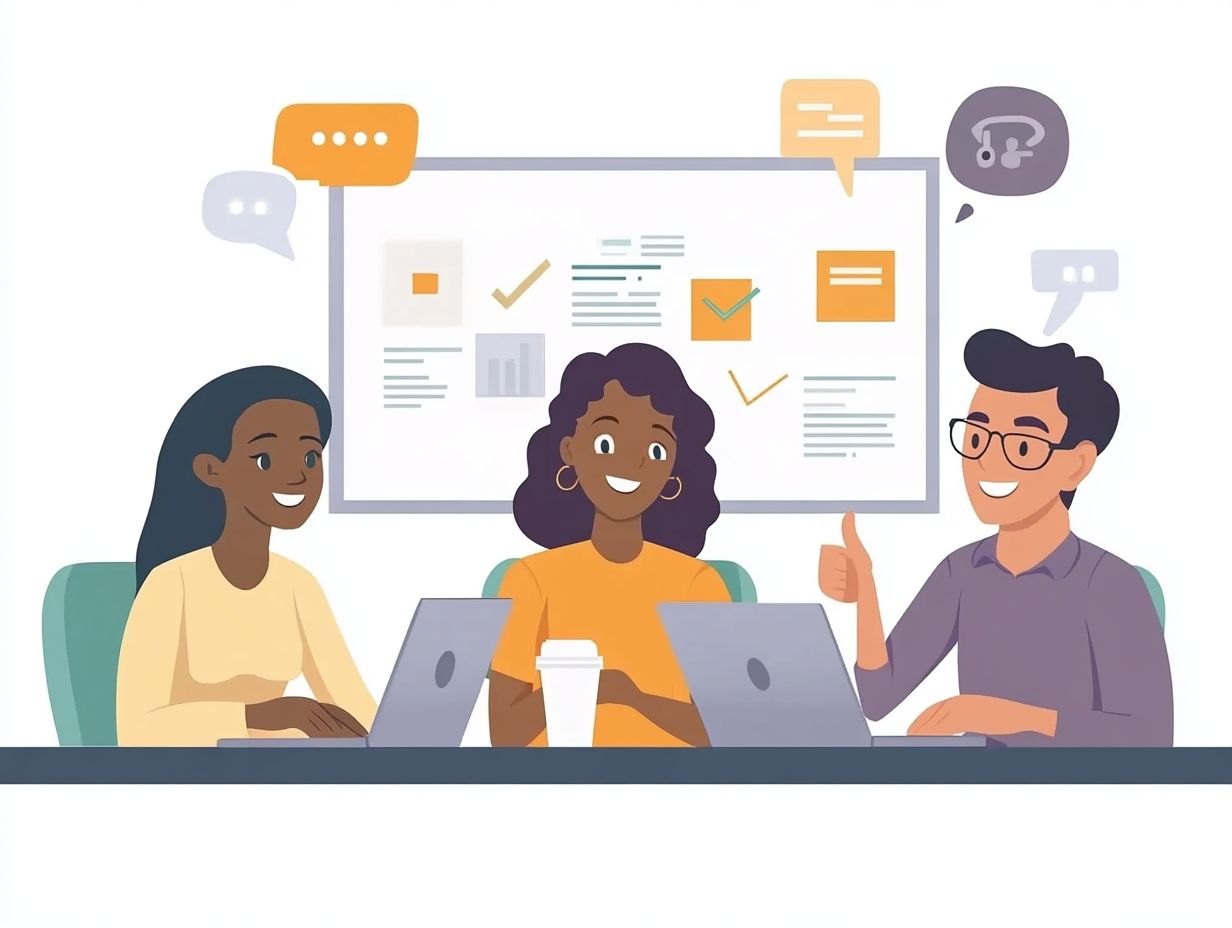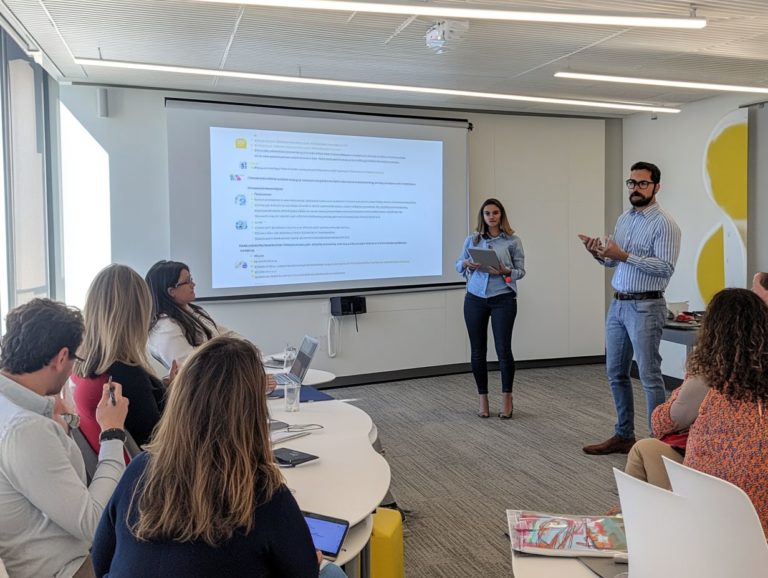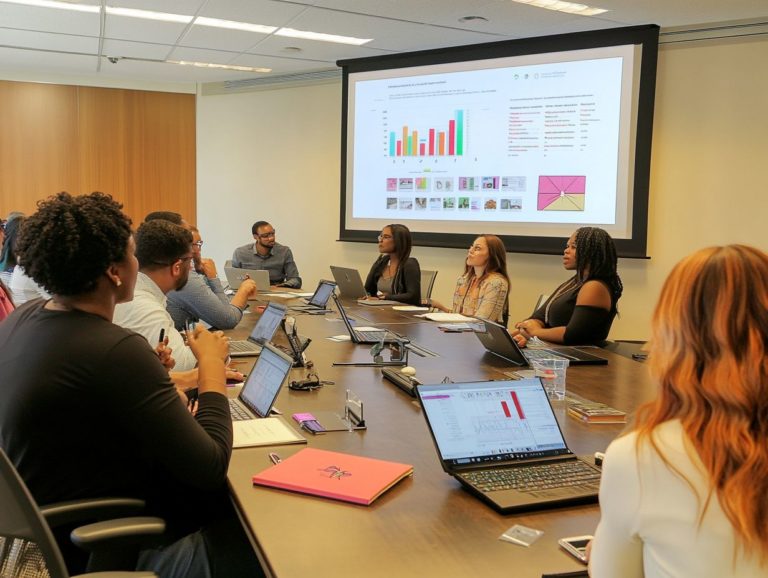“Effective Communication for CRM User Support”
In today s fast-paced digital landscape, managing customer relationships is vital for building strong client connections. Let s dive into the world of CRM user support!
The success of your CRM initiatives hinges on providing effective user support. This discussion explores the foundational aspects of user support, highlighting the indispensable role of communication.
From the art of active listening to clear messaging, discover key elements that elevate user experiences. Explore best practices for managing support interactions and ensuring customer satisfaction.
Join in as you navigate essential strategies for delivering effective CRM user support.
Contents
- Key Takeaways:
- Understanding CRM User Support
- The Importance of Effective Communication
- Key Elements of Effective Communication
- Best Practices for Communication in CRM User Support
- Ensuring Customer Satisfaction
- Frequently Asked Questions
- What is the importance of effective communication in CRM user support?
- How can effective communication help in addressing user issues?
- What are some key communication skills for providing effective CRM user support?
- How can communication barriers impact CRM user support?
- How can communication be improved in CRM user support?
- Why is it crucial to maintain a positive attitude in communication for CRM user support?
Key Takeaways:

Effective communication is the secret ingredient for outstanding CRM user support! It builds trust, fosters understanding, and ensures your customers stay happy.
Active listening, clear messaging, and empathy are essential in CRM support. Establishing a supportive tone, using various communication channels, and handling tough situations are key best practices.
Understanding CRM User Support
Understanding CRM user support is vital for maximizing customer relations. Effective user support improves how CRM software works, leading to smoother interactions and happier customers.
By adopting robust internal communication strategies and CRM best practices, you can manage customer data more effectively. A well-structured support system will directly influence your client relationships, ultimately improving business operations and overall performance.
What is CRM User Support?
CRM user support helps you utilize customer relationship systems effectively. It’s all about ensuring you can access features, troubleshoot issues, and fully understand the software’s capabilities.
This support is essential for optimizing your experience, leading to better customer interactions and greater satisfaction. Its main goals are to facilitate smooth access to system features and deepen your understanding of the software.
Incorporating various forms of support like responsive customer service tools, comprehensive training programs, and abundant resources like FAQs significantly enhances your capabilities.
This all-encompassing approach gives you the power to navigate CRM systems with confidence and builds stronger, more lasting relationships with your clients.
The Importance of Effective Communication
Effective communication is the backbone of great CRM support! Clear dialogue shapes customer satisfaction and loyalty.
In the world of customer relationship management, your ability to communicate clearly enhances user understanding, encourages valuable feedback, and informs necessary adjustments to your CRM strategy.
Using multiple communication methods ensures that customer queries and concerns are addressed promptly, creating a seamless experience for users as they navigate CRM software.
Integrating robust communication practices strengthens client relationships and optimizes business operations as a whole.
How Communication Impacts User Support
Communication in your CRM system shapes how well customers are supported. It affects the interaction quality between representatives and clients, directly impacting satisfaction.
Utilizing various methods, such as live chat support and automated messaging, creates a dynamic environment that effectively addresses client needs.
Live chat offers real-time communication, allowing users to receive instant feedback and resolutions, significantly enhancing their experience.
Conversely, automated messaging streamlines responses to frequently asked questions, allowing representatives to focus on more complex inquiries.
CRM analytics deliver valuable insights into these communication strategies, enabling you to evaluate which methods resonate best with your clients. By analyzing this data, your service teams can tailor their interactions, fostering personalized experiences that ultimately strengthen client relationships.
By mastering these strategies, you ll not only improve your CRM user support but also delight your customers!
Key Elements of Effective Communication

Key elements of effective communication in CRM user support include active listening, clear messaging, and demonstrating empathy. These components are vital for ensuring that customer interactions are meaningful and productive, fostering stronger relationships with clients.
By embracing these principles, you can implement CRM best practices that not only enhance communication but also efficiently address customer needs. This approach boosts customer satisfaction and enhances engagement across CRM channels, paving the way for greater success in your CRM strategies.
Mastering Active Listening
Active listening is an essential element of effective communication, giving you the power to fully grasp the needs and concerns of customers during interactions.
When you practice active listening, you elevate the quality of your customer service, ensuring that customers feel valued and understood. Techniques like reflecting, paraphrasing, and summarizing are vital for refining this skill, allowing you to clarify points and demonstrate genuine empathy.
By doing so, you address individual customer issues with greater accuracy while gathering valuable insights that inform broader CRM strategies. This interplay between listening and support enhances customer satisfaction and contributes to your organization s overall efficiency.
Clear and Concise Messaging
Clear and concise messaging is paramount in CRM user support environments. It ensures that you easily grasp the information being conveyed, preventing misunderstandings and elevating the overall user experience.
As you navigate through various CRM channels whether it s email, chat, or social media well-crafted messages can significantly enhance your interactions. For example, use bullet points to outline steps in a troubleshooting process or adopt a friendly tone to foster rapport.
These strategies not only facilitate effective communication but also contribute to heightened customer satisfaction. When customers feel informed and supported, their loyalty increases, allowing businesses to flourish in a competitive landscape.
Empathy and Understanding
Empathy means understanding and sharing the feelings of others. It is essential in CRM user support, enabling you to build a deeper connection with your customers.
When support teams prioritize emotional intelligence, they create an environment where customers feel truly heard and valued. This connection accelerates issue resolution and enhances overall satisfaction.
Using strategies like active listening, acknowledging customer feelings, and personalizing responses can dramatically elevate your interactions. Training your staff to recognize emotional cues strengthens this empathetic approach, allowing representatives to tailor their responses effectively.
By showcasing genuine empathy, support teams cultivate loyalty and trust, turning challenging situations into golden opportunities for brand advocacy.
Best Practices for Communication in CRM User Support
In CRM user support, adopting best communication practices is essential. Establishing a supportive tone fosters a welcoming environment for users.
Use various communication channels to meet users in their preferred ways. Handling difficult situations with grace and efficiency enhances their experience, ensuring you address concerns and build lasting relationships.
Start applying these practices today to see results!
Establishing a Supportive Tone

Establishing a supportive tone in your communications with customers is vital for effective CRM user support. It significantly enhances customer satisfaction.
When support representatives use a warm, empathetic approach, they acknowledge the customer s feelings. This creates an inviting space for open dialogue.
Simple phrases like “I understand how you feel” or “I m here to help you” can dramatically shift the conversation toward a more positive outcome.
When customers feel understood and valued, it fosters loyalty and strengthens their overall relationship with your brand. This leads to long-term engagement and satisfaction.
Utilizing Various Communication Channels
Using various communication channels is essential for effective CRM user support. It allows you to engage with customers on their preferred platforms.
This strategy aligns with individual preferences and boosts the chances of receiving timely and effective responses.
For example, live chat offers immediate assistance, enabling you to resolve issues in real-time. Social media provides a casual environment where customers can voice their concerns.
Automated emails keep communication open by sending follow-ups or resolutions to inquiries. By leveraging these diverse channels, you can cultivate more meaningful interactions!
Handling Difficult Situations
Handling difficult situations effectively is crucial for CRM user support. It requires well-crafted communication strategies that address customer concerns promptly.
Your ability to navigate these challenging interactions can significantly influence customer satisfaction and loyalty.
By using techniques like active listening and empathetic responses, you can better understand the emotions and frustrations of your customers. Maintaining clear messaging ensures that information is accessible and relevant.
This method helps create positive conversations and paves the way for collaborative problem-solving.
Recognizing the importance of tone and body language can further help you de-escalate situations. This transforms potential conflicts into valuable opportunities for building stronger relationships!
Ensuring Customer Satisfaction
Ensuring customer satisfaction is paramount in CRM user support. It directly influences your client relationships and retention rates.
Unlock the power of CRM analytics to transform your customer interactions! Establishing feedback loops allows you to gain valuable insights into customer interactions.
This proactive approach enhances overall customer satisfaction and plays a crucial role in your long-term business success!
Measuring Success and Addressing Feedback
Measuring success in CRM user support means assessing customer satisfaction through various metrics. Effectively addressing feedback is also essential.
To gain a comprehensive understanding, focus on key performance indicators (KPIs) such as response times and resolution rates. These metrics provide valuable insights into how promptly and efficiently your support team is handling issues.
Regularly analyzing customer feedback reveals areas for improvement. This allows you to refine your CRM strategies and build stronger client relationships.
By actively engaging with customers and implementing changes based on their suggestions, you’re enhancing service delivery! You’re also nurturing loyalty and paving the way for long-term satisfaction.
Frequently Asked Questions

What is the importance of effective communication in CRM user support?
Effective communication is crucial in CRM user support! It helps build trust, resolve conflicts, and increase customer satisfaction.
It ensures that users receive accurate and timely information, leading to a better overall experience with the CRM system.
How can effective communication help in addressing user issues?
Effective communication helps address user issues by providing clear instructions and listening deeply to their concerns. Understanding the user’s perspective leads to quick solutions.
What are some key communication skills for providing effective CRM user support?
Key skills include really listening, showing empathy, and giving clear explanations. Adapt your communication style to meet each user’s needs.
How can communication barriers impact CRM user support?
Language differences and complex words can cause misunderstandings. This can frustrate users and slow down problem resolution.
How can communication be improved in CRM user support?
Train support staff on effective communication techniques. Use simple language, listen actively, and gather feedback to close any gaps.
Why is it crucial to maintain a positive attitude in communication for CRM user support?
A positive attitude creates a supportive environment for users. It shows empathy and dedication, leading to a better experience with the CRM system.






